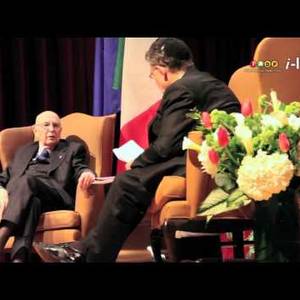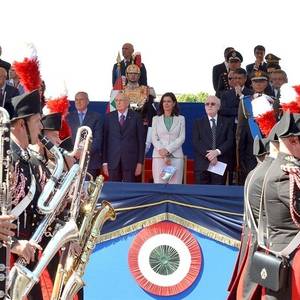Born in Naples back in 1925, at ninety-two former Italian President Giorgio Napolitano is vital and surprisingly sturdy intellectually and physically, as his latest interview show
You chose: giorgio napolitano
-
-
Former President Giorgio Napolitano left office definitively Jan. 14, returning to his home in Rome’s colorful, ancient Monti quarter, a stone’s throw from Trajan’s Forum. His departure after nine turbulent years in office was moving to watch as, in the great courtyard of the Quirinal Palace, he received the formal farewell salute of a horseback brigade in full regalia. Now, with that ritual behind, the less elegant horse trading to elect a successor begins in earnest. Two years ago Napolitano agreed to succeed himself only to break a long political stalemate. The question is whether that stalemate will be repeated, without a Giorgio Napolitano to smooth over a difficult transition
-
Enjoy the highlights of the President of the Italian Republic's visit to New York City (2011) Italian President Giorgio Napolitano, who led the country through one of its stormiest political periods, resigned today. The government accepted the 89-year-old’s resignation. He left the Quirinale Palace, the official residence of the president, with his wife Clio after a brief ceremony while also saying a emotional farewell to his staff. 2011. Enjoy our full coverage of President Giorgio Napolitano in NYC
-
It now appears certain that Giorgio Napolitano will resign as of Jan. 14, at the top of Italy’s current political agenda is election of his successor. Before this happens, let’s consider what the function of an Italian president is – unlike the royals of Britain or Spain, he is far more than a ceremonial figurehead – and then take a backward look at the presidents of the past.
-
On November 4th, Fabiola Gianotti, Italian physicist, was named first female Director General at CERN, the International Nuclear Research Lab in Switzerland.
-
The full text about a presumed swap between the Italian powers-that-be and the Sicilian Mafia back in the Nineties is yet to be released. But already President Giorgio Napolitano’s three-hour testimony Oct. 28 before a Palermo court, transferred inside the Quirinal Palace in Rome, confirmed that the Sicilian Mafia had indeed tried to blackmail the Italian government. Because of his office, Napolitano was not obliged to answer prosecutors’ questions, but elected to do so and, in so doing, offered an admirable image of democracy at work.
-
On June 2 Italy marked the 68th anniversary of the founding of the Republic with a parade in Rome and the traditional overflight of the Frecce Tricolori military airplanes, which left in the bright blue sky trails of the colors of the Italian flag. Appearing together with Premier Matteo Renzi at the tomb of the unknown soldier at Piazza Venezia, President Giorgio Napolitano spoke movingly of “all the Italian soldiers who sacrificed their life in the service of the nation.” Just a century ago World War One began, and European nations fought each other. Today, said Napolitano, they stand under the same flag.
-
President Barack Obama's brief but busy visit to Rome and to the Vatican resulted in an invitation, backed by President Giorgio Napolitano, to return to Italy for a longer visit in June. The sole sour note came from Beppe Grillo, who shouted that the U.S. president "comes here to hustle his economy and to get himself photographed with the Pope. He's here to sell us his gasoline and because he's worried that we will cut back on buying the F-35s."
-
The proposal for a revision of the election process finally made it into the Chamber of Deputies this week, as neo-Premier Matteo Renzi had promised, but it does not quite resemble the deal expected after he and former Premier Silvio Berlusconi had a widely publicized (and widely criticized) meeting to hash it out. In the Senate, Beppe Grillo, head of the Movimento Cinque Stelle, went on a North Korean-style warpath, casting out dissidents. New polls show center-right and center-left neck and neck, and, for Grillo, disapproval.
-
Premier designate Matteo Renzi is a man in a hurry. After being tapped by President Giorgio Napolitano on Monday, he declared that he will "go for broke" to introduce reforms and that he intends for his government to last four years, or until the natural end of the legislature. He has listed four crucial political goals, with deadlines. Most, however, are the same goals that have frustrated his predecessors in office. On entering Parliament Tuesday Renzi--who is not an MP--actually got lost and had to be shown the way. Can he help Italy find its way out of what he has called "a swamp"?







































